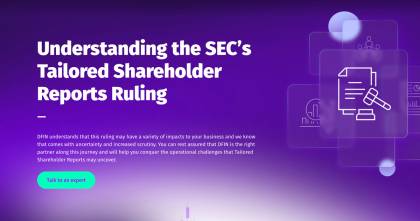What lies ahead for the global investment industry in 2025? From navigating the post-Tailored Shareholder Reports (TSR) world to charting new territories on AI — both alternative investments and artificial intelligence — to measuring the impact and influence of new global requirements, we can expect more change with greater momentum. In this article, Eric Johnson, DFIN’s president of Global Investment Companies, addresses the top questions facing fund and asset companies heading into 2025.
Let’s start with Tailored Shareholder Reports. Now that DFIN clients are fully compliant, what have been the learnings from that process?
TSR represented a major process change, due to overall volume, an accelerated timeline and the complexity of requirements. In the end, it ultimately resulted in the need for a variety of operational changes in order for companies to stay compliant.
The extent of iXBRL tagging was new for many firms, along with share-class-level reporting and ADA requirements. They all demanded very specific, process-oriented systems, and there were challenges across the industry.
Due to DFIN’s expertise in this space, we were able to quickly adapt and move into implementation with our ArcReporting solution. It ensured 100% compliance for our clients and earned us the Nicsa NOVA Award for Industry Innovation in Product Development.
DFIN’s successful development of our TSR solution speaks to the importance of having the right software providers in place who can interpret SEC mandates and operationalize them. As we see TSR-like regulations taking shape in Canada and Europe, the importance of having a partner with global experience can’t be underestimated.
Where do you see the industry headed now that most have completed their first TSR cycle?
TSR is not a one-and-done, set-it-and-forget-it solution. According to an audience poll taken at the 2024 Tax and Accounting Conference, only 17% of those surveyed plan to keep their current TSR process as final state. The majority plan to evolve their TSR process to build on what they’ve learned.
Looking ahead, the operational piece will be the key to success. The focus will be on process and how to improve the speed, quality and tagging of TSRs. That will add value to firms by increasing automation levels and ultimately reducing costs.
The question to ask is where do you want to be going forward? Regarding iXBRL tagging, consider how you manage it on the risk/return side. What review process do you want to have, not just for internal efficiencies but also to meet ongoing SEC review?
As the SEC and other global regulatory bodies continue to move forward with tighter regulations around data and reporting, we see TSR as just the beginning.
The alternative investments market shows no signs of slowing down. What do you anticipate we’ll see on the regulatory front?
The alternative investments market currently represents over 50,000 funds in the U.S. according to the SEC. With those kinds of numbers, we can expect heightened regulatory interest in the next few years as major global regulatory organizations seek better transparency in this space.
In the U.S., required compliance on Rule 13f-2 will begin on January 2, 2025. Institutional investment managers that meet or exceed specified reporting thresholds will need to file Form SHO on a monthly basis. The SEC will begin publishing aggregated data about short positions and short sale activity approximately three months after the compliance date.
Artificial intelligence seems to be touching every aspect of our lives. What ways, if any, do you see artificial intelligence being used in the funds industry?
Our customers live within highly regulated industries and rely on us to handle highly confidential data for their employees, clients and investors.
Our position is that artificial intelligence is a powerful technology that is in the early stages of defining the tangible impact of AI relative to its perceived value to our customers. Living in a highly regulated environment requires increased attention to data security, privacy and governance. For example, our customers’ confidential data cannot end up training public models or be accessible by any AI platform.
That’s why we are being strategic as to how and where AI is used with a vigilant focus on security. This includes both AI that we are developing within our own platform and those that are offered from third-party vendors. The only way forward is to create solutions that solve our customers’ challenges and provide innovative solutions that put security and privacy first.
As David Wu, head of generative AI at Morgan Stanley Wealth Management, said in the keynote session at the recent 2024 Nicsa Wealth & Asset Management Conference, “AI does not replace years and years of trust.”
The future of AI is yet to be written within our industry, but we are excited about a path that combines the benefits of AI and its efficiencies with the decades of experience we have serving our customers.
The industry is increasingly seeing the impact and influence of rulings on a global scale. How can investment companies meet these new requirements?
I think we’re at a pivotal moment on the global front. There are emerging regulations, both in Canada and Europe, that are similar to TSR, with its focus on data, statistical reporting and modernizing disclosure.
Conversely, in Europe, ESMA has established mandates and rulings around ESG funds. This is an area in the U.S. with growing SEC interest and activity. Case in point is the Names rule, with a compliance deadline of December 2025, which states that a fund’s investment portfolio should match a fund’s advertised investment focus, be that growth, value or ESG.
Here at DFIN we look at solutions with a global lens, giving us a unique purview in the marketplace today. That enables us to make decisions based on global impact.
As Arc Suite expands its presence in Europe, Australia and beyond, we can provide proven, ready-to-deploy compliance solutions when new regulations are put in effect. This gives our clients greater confidence in their own decision-making and trust in our end-to-end implementation. Having a Regulatory Book of Record (RBOR) in place, with DFIN as a trusted partner, can help clients get ahead of timelines and onboarding processes, including extensive security checks.
What’s next on the horizon? Where is the team at DFIN currently focused?
We’re working to solve the next wave of regulations all while enhancing our innovative suite of software solutions. In addition to the Names rule and Rule 13f-2 with 2025 compliance dates, EDGAR Next represents one of the most significant changes to the SEC filing process.
Intended to enhance investor security and improve filer access, EDGAR Next is a major modernization of the Electronic Data Gathering Analysis and Retrieval system. All SEC filers are required to enroll in EDGAR Next and delegate filing authority to their filing agents.
With the SEC beta-testing environment open, DFIN is providing real-time support and insights to our clients with a transition process in place to prepare, enroll and meet the mandatory compliance date of September 15, 2025.
In an evolving regulatory climate, there’s an increasing need for a deeper level of service and expertise — including a partner that goes beyond just providing software and can be a trusted resource, providing domain knowledge, account familiarity and experience working with the SEC.




